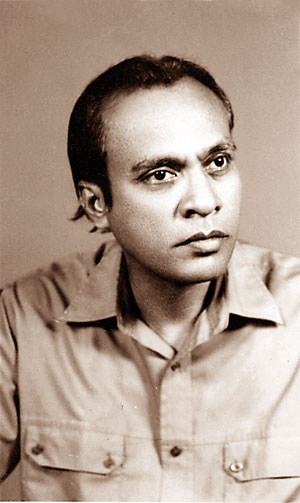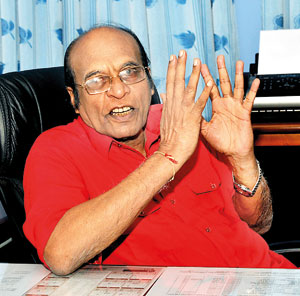Sunday Times 2
Reminiscing DEW’s days at Inland Revenue

Young DEW as IRD assessor
During the 1960s and 1970s Dew was a well-known and popular figure in the Inland Revenue Department (IRD). I first came to know him when I joined the IRD as an investigating officer. Incidentally the first time we met each other, someone introduced him and I heard his name as Duke. I felt that it suited him well – a tall smart distinguished looking young man. Everyone knew him for his amiable nature and helping hand.
We have known each other for over fifty years and he has been a tower of strength to me. I was new to many of the procedures, practices and nuances of the varied activities of the department and it was to Dew that I turned for advice and guidance.
Helping someone in need is Dew’s second nature. It will take a lot of space if I am to recount those varied instances. He will always go the extra mile to be of assistance and expect nothing in return. In fact, he accompanied me to the Nursing Home when I took my wife Sita for her second confinement. On many an occasion he has given me his own car for me to travel up to Kandy.
In the department, we had a fine team of investigating officers who were highly rated and deeply committed. Led by Dew and seniors like Eddi, Shan, Sachi, Ronnie, Nava, Sundereswaran, Dudley, Manda and Bala, they were indeed a formidable team. It was like a brotherhood. The business community had the highest regard for us. We were the pioneers of field investigators.
Dew used to tell us how much he learnt working under highly qualified men like Inland Revenue Commissioner S. Sittampalam, an old Royalist with a first class in maths. Mr. Sittampalam was an administrator of the highest calibre and an amateur astrologer very much in demand among the elite in Colombo. It was said that his profession was astrology and his hobby income tax.
It was a time when we had a galaxy of intellectual giants, men of integrity who treated public service as a sacred duty. The same sterling standard was maintained by C. Sivapragasam, our Deputy Commissioner (Investigations) who ended up as Commissioner General. Dew was deeply indebted to Commissioner General Hugh Molagoda, a fine cricketer, disciplinarian of the highest order for his excellent advice and leadership qualities. One of his other leaders he used to talk about was A.G. Jeyasothy, Jegs as he was fondly called, a first class in history. His reports and memos were a treat to read – impeccable English in all radiant brilliance and superb analysis.
I believe Dew’s ability to analyse problems and spell them out in superb form must be due to the training he received from those excellent officers. He used to say that he was moulded into what he was during his IRD days, his high sense of honesty, integrity and devotion to service, among other virtues. He will often recall the names of other equally fine officers and gentlemen like Murugesu, Duleep Kumar and J.C.L. Fonseka.
He worked under Deputy Commissioner Sivapragasam, who was an excellent investigator, a fine disciplinarian, a true leader to our team of Investigating Officers. Siva as he was fondly called had a high regard for Dew and I believe it was mutual. Siva used to have confidential discussions with Dew before organising high profile inspections and raids.
Dew’s contribution to extra-curricular activities of the department needs special mention. He had an abiding interest in trade union activities and was the Secretary of the Joint Committee of Trade unions and contributed immensely to bring about a unified force. He was also the Secretary of the Recreation Club and the Literary Association. His innovative service to the furtherance of Buddhist activities, as Secretary of the Buddhist Association was most commendable considering the period when such activities were frowned upon by the management.
A significant development in the1970s was the restructuring of the department to make it a closed service. A spin-off from that was the option given to investigating officers to retire from service if they so desired. By this time I had taken oaths as an Advocate and was eager to utilise that opportunity. Since Dew himself entertained such an idea, he suggested that the two of us meet Sivapragasam to seek his advice. That meeting was a sign of times to come. When we broached the subject, Siva, who was well known for his quick and correct responses, without the least hesitation said, “Dew you can retire and I can tell you, you will end up as a minister” and so it happened. I was advised to remain for some time.
As a Trade Union leader, he came into direct contact with three distinguished Finance Ministers, namely Felix Dias Bandaranaike, T.B. Ilangaratne, and Dr. N.M. Perera. As a young trade union leader, it was Dew who received Dr. N.M. Perera when he made his first official visit to the Department of Inland Revenue in 1964. The top officials were stunned when he addressed the minister as “sahodaraya” (comrade).
As I am writing this note I can see the panoramic view of the Misty Hantane Range from my lobby upstairs. We are fortunate to live in such a salubrious, unique and beautiful setting because of Dew’s initiative and active participation when he was Minister Pieter Keunaman’s Private Secretary. He obtained government approval in record time for a housing scheme for public servants. Nearly fifteen families living here have been testimony to his great service and will be forever grateful to him.
Of the numerous occasions of raids and inspections where Dew was deeply involved a few need special mention. On a certain day Deputy Commissioner Saliya Parakrama, incidentally one of those unique men who adorned the IRD and a one-time chess champion of Ceylon, walked in with a bulky file to Sivapragasam’s room in the famous Investigation Unit called Unit (a). He reported that this particular individual neither pays nor sends in annual returns. All assessments were under appeal; He was not interested in settling the appeals. Therefore, a raid was recommended and Dew was assigned this job. He got a team organised.
The business happened to be a big hotel in Hulftsdorp, well patronised by leading men, including legal luminaries.
The operation began at 9 a.m. and went on till 7 p.m. In the process unaccounted cash amounting to Rs. 200,000 (in 1969) was detected. The businessman pleaded, saying the money was kept there for safe keeping by a VIP. Dew then insisted on a written statement to that effect. This was promptly given.
The following morning Commissioner Sittampalam received a telephone call from a VVIP making inquiries about the inspection Dew was sent for.
In the meantime, Dew had the political scent and intuition and was ready with a comprehensive report, having prepared it in the night. Sittampalam promptly telephoned the VVIP and explained the position. The VVIP then had told Sitta “go ahead, I am not interfering”.
Finally, the businessman’s undisclosed income was quantified and liability fixed. This paved the way for a file being re-opened. That was the prestigious department cat work: Men of integrity giving it the strength.
Another instance was an inspection of a house and business concern belonging to a well-known thug from Welikada called Welikada Suda. The raid was conducted by a team led by Dew. It included several lady officers (Dayani de Silva and Srima Disanayake among them). They were not aware where the team was heading. When they later heard that it was the house of Welikada Suda, they felt nervous as they were aware that a public officer had been killed by him.
Regardless of all this the team went ahead and was tactful in handling the taxpayer’s mother who was nevertheless furious. The team got the necessary information and left a message with the taxpayer’s wife to report at the Department the following day, as her husband was absconding. However, the following morning he appeared before the investigating officers. He accepted liability and confessed that he was attempting to throw a hand bomb when the investigating team was at his residence.
He had given up the idea since his wife had told him that the officers were kind and respectful. His business was located right in front of the then President’s house in Ward Place.
A well-known inspection was the raid on the premises of a Kurunegala business tycoon. The team, including Dew, resisted political pressure when it was found necessary to have the business sealed up and Police posted.
The businessman involved was a big time politician and an ex-Army Officer. He finally surrendered and paid up his liabilities ungrudgingly. A minister walked into the shop and prevailed on us to stop the raid. It must be said that the prestigious man of integrity, Finance Minister U.B. Wanninayake held with the officers who conducted the raid.
I am greatly pleased and much humbled to pay this tribute, an appreciation of Dew’s tremendous contribution to the political cause he espouses, the Inland Revenue service he loves and the country in general.
| DEW Gunasekera: 60 years in politics DEW Gunasekara, General Secretary of the Communist Party of Sri Lanka, has completed 60 years in politics. DEW Gunasekara after his secondary education entered the Public Service at the age of 19. He was attached to the Department of Inland Revenue. Having pursued higher education while in service, he held the post of Investigating Officer and Assessor of Inland Revenue.  DEW Gunasekera A student of politics from his young days, he was influenced by the powerful trade union and left movements. He was also an ardent student of international affairs. Attending Marxist Classes conducted by the Communist Party Leaders, he enhanced his knowledge on Marxism and other social sciences. He joined the Communist Party of Sri Lanka on October 24, 1958. When Communist Party General Secretary Pieter Keuneman was appointed as the Sri Lanka’s first Minister of Housing and Construction in the United Front Government, DEW was chosen as the Private Secretary to the Minister. In 1972, DEW was elected to the Communist Party Central Committee at its 8th National Congress. Having left the Public Service in 1976, he became a full timer of the Party. On his being elected to the Party’s Political Bureau, he functioned as the Party’s first International Secretary. He was a functionary in the editorial staff of the party newspapers Mawbima, Forward and Aththa. He was a member of party’s official delegations to Socialist countries. He entered Parliament in 1986, 2004 and 2010. He functioned as a leading opposition member and held several ministerial Posts while in the government. He held the post of CPSL General Secretary from 2001 during which period, he was confronted with domestic and international challenges. With the Collapse of the Soviet Union and the consequent onslaught on the Marxist movement, Comrade Dew valiantly joined the party’s ideological struggle. The hallmark of his political career was his commitment to national unity, left unity, and the struggle against neo-liberalism. Dew, who belongs to third generation of Sri Lankan Left Movement, is the most senior left politician in the country.
| |
(The writer is Retired Senior Assessor, Department of Inland Revenue)

